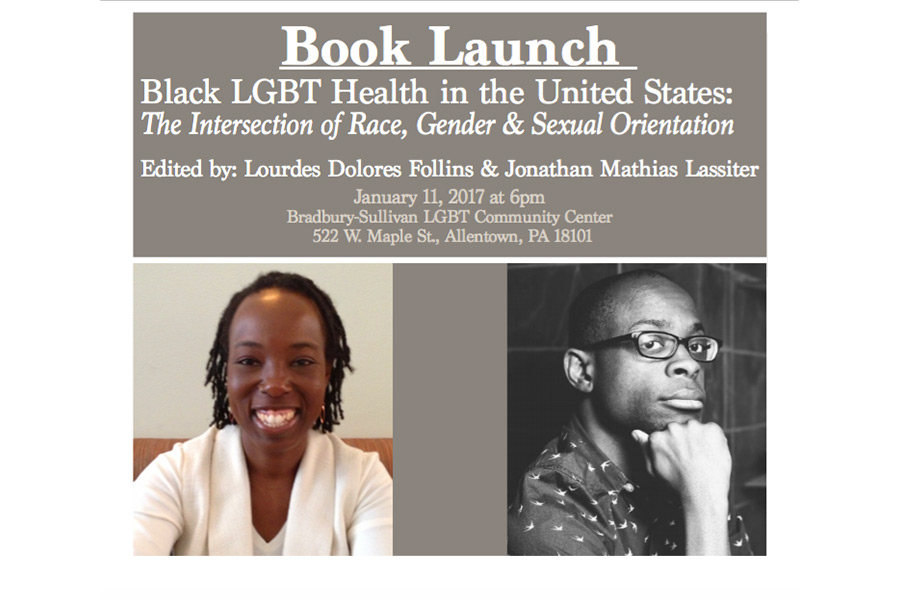The co-editors of an academic text exploring the state of black LGBT health will be on hand to discuss their new work next week at Allentown’s Bradbury-Sullivan LGBT Community Center.
The center will host a book-launch event for “Black LGBT Health in the United States: The Intersection of Race, Gender and Sexual Orientation” 6 p.m. Jan. 11 at 522 W. Maple St. in Allentown.
Lourdes Dolores Follins and Jonathan Mathias Lassiter, who edited the compilation of nearly two-dozen contributions from researchers and health-care professionals, will discuss the book and then engage with audience members over coffee.
Follins said the book was a “natural” fit for her.
“I’m a member of these communities and have been working with, for and on behalf of these communities for 23 years now,” she said, noting she conceived of the work after a publisher for whom she had contributed a chapter on the topic asked if she had a fuller proposal about the issue of black LGBT health.
“About a month later, I thought, Wait a minute; let me see if anything has been written about black LGBT health in the United State that’s not about HIV, that doesn’t pathologize the community. There was nothing, no books,” she said. “I thought, There’s a need for this and I’m in a position to pull people together to work on this.”
Lassiter said the book provided the needed opportunity to amplify the voices of black LGBT people working in the health field.
“One of the things that was important to [Follins and me] was to make a space for black LGBT researchers and health-care providers to really talk about the issues of our community in a way that highlighted both the risk and resilience in this community,” he said. “Most research on black LGBT folks has been done by people who are not black or LGBT. We wanted to center the voices of black LGBT folks and have the researchers and the people out there doing the work on the ground, as far as health care is concerned, contribute to that.”
While the topics are academic in nature, they’re written in a way that is relatable to non-academic audiences, Lassiter added.
“We hope it will inspire folks,” he said. “We really tried to craft the book in a way that it not only spoke to academics but to regular everyday folks whose voices are often left out of the conversation.”
Ultimately, 21 people, as well as Follins and Lassiter, contributed to the book.
While each of the contributions is unique, Follins said they all speak to a unifying message.
“When you look at public-health research and mental-health research in this country about black lesbian, bisexual, transgender, queer, same-gender-loving people, the overarching theme is ‘These poor people, they suffer so much trauma that they can’t possibly do well.’ When we looked at the people we worked with, clients or colleagues, that’s just not true,” Follins said. “While we may have an enormous load to bear, at the end of the day, we’ve still found ways to survive and thrive. We wanted to look at what people are doing in this country, what they’re thinking about, whether that’s theory, whether that’s research, to see that when people do go through various issues around racism, sexism, transphobia, how are they surviving?”
The editors will discuss these and other questions during next week’s book-launch event at Bradbury-Sullivan.
Lassiter recently moved to the Allentown area to take a position as an assistant professor of psychology at Muhlenberg College. He heard of Bradbury-Sullivan’s work through colleagues and connected with executive director Adrian Shanker, a Muhlenberg alum.
“I know the really outstanding work that Bradbury-Sullivan has done with the LGBT community in Allentown; I think it’s a much-needed resource,” Lassiter said. “I’m happy to have this collaboration with them.”
Shanker noted that promoting LGBT health has been one of the core values of the community center.
Given the diversity of the communities it serves, the book event was a good opportunity for community engagement, Shanker said.
“The Lehigh Valley is a very diverse community; Allentown is a majority-minority city,” he noted. “We care deeply about providing information to our communities about LGBT health, including the special challenges for LGBT people of color. This was a great opportunity to celebrate a local researcher in Jonathan Lassiter but also to be able to highlight critical issues for the community: the intersectionality of race and sexual orientation with regard to health.”
The launch event for “Black LGBT Health in the United States” is free and open to the public. For more information, visit www.bradburysullivancenter.org.

